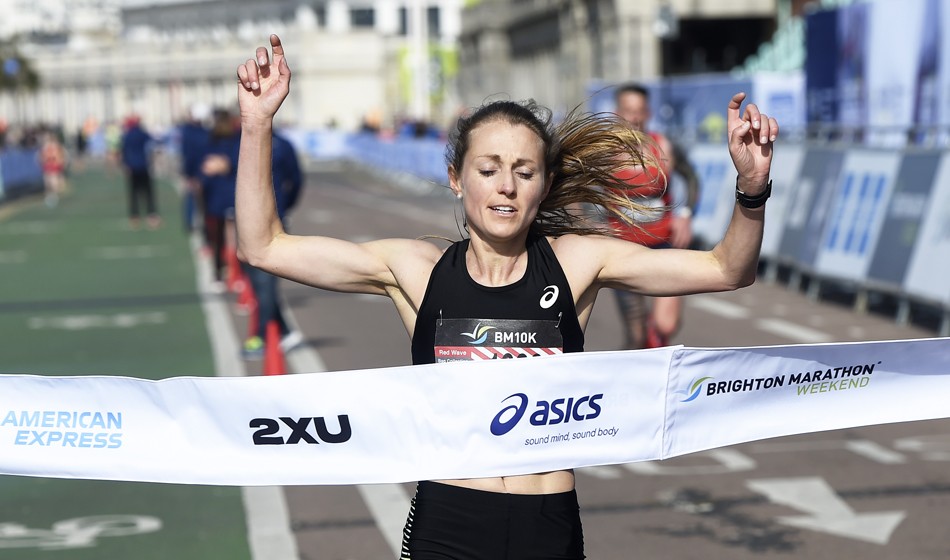
Welsh marathon record-holder explains how she has rocketed up the rankings and fought back from illnesses to clock the World Championships standard
While some may prefer to stay indoors during the cold months of winter, Natasha Cockram is out on the roads and the track, clocking up the miles in pursuit of further success. She will also be hoping to ensure that 2023 proves to be less of a rollercoaster than last year proved to be.
While 2022 finished with the high of a Welsh record-breaking marathon run of 2:26:14 in Valencia, there were a number of lows to overcome, too.
Back in January 2022 I joined my new coach Robert Hawkins and planned to race Seville in February but got bronchitis so I couldnt, says the 30-year-old.
I then turned all focus to the Commonwealth Games. Id say that is the most Ive ever focused on a race and it was the best shape I have ever been in, but race day didnt go to plan. I was testing negative for Covid, but something wasnt right and a few days after the race I tested positive.
Coming 12th in 2:40:18 did not represent the height of Cockrams ambition.
Natasha Cockram (Mark Shearman)
We suspect I was ill on race day but we will never have the answers as to whether it was Covid or something else, she adds. Following the positive test, it took me quite a few months to really get back into proper training.
Marathon training is hard enough when firing on all cylinders, but Cockram had to dig deep mentally and physically to fight back to fitness.
I found it tough missing races, particularly The Big Half and Great North Run, she continues. But I was struggling to even run five steady miles, so I had bigger things to worry about. At times I wondered if Id ever even get back to where I was especially seeing long Covid stories in the media. After weeks of struggling, I realised Id have to be patient and listen to my body.
Even when preparing for Valencia, I approached it with the mindset if I am ready great, but if Im not, its not the end of the world. This was quite different to how I approached the Commonwealths, where I paused everything and used annual leave [from her day job as an HR researcher] to focus on training and recovery.
This meant preparations were different, yet effective. I took a more relaxed approach for Valencia, she adds. I always got the training done that coach set but I continued to enjoy other things that some might see as detrimental. I continued to work, ride my horse and even compete on him throughout the whole training block.
This approach resulted in a run which destroyed her Welsh record by almost four minutes, put her sixth on the all-time British marathon rankings and was inside the qualifying standard for this years World Championships in Budapest.
In a year of two halves, Cockram has had time to reflect and is now focused on building on her success.
It just felt so good to end the year on a high after a challenging one, she says. Its the first time Ive ever run a world standard so thats exciting but its more exciting to know that there is more to come.
At the time of writing, Cockram was yet to confirm her racing plans for the year ahead but she added: I cant wait to get stuck back in and build to the next marathon.
Natasha Cockram is based in Norfolk where she can run through the stunning forestry and be completely alone in her training. She clocks 80-120 miles a week, depending on where she is in her training block. It is such a great way to clear my mind after a long day in front of the computer at work. It really is true that movement can free the mind and improve both physical and mental wellbeing, she adds.
Natasha Cockram (London Marathon Events)
Typical training week
Monday Either a single easy run or double easy run.
Tuesday A progression run (for example, a few miles easy then seven miles of progression which would start slower than marathon pace but finish faster than marathon pace) or some tempo/marathon pace miles followed by faster kilometre intervals.
Wednesday Either a longer easy run (14-16 miles) or double easy run.
Thursday Easy run (sometimes double easy).
Friday Big threshold kind of session with more of a continuous effort. Something like a few miles easy followed by kilometre reps with a float recovery. Generally around 22 miles, including the warm-up/cool down.
Saturday Easy (occasionally double easy).
Sunday Long run day. Anything from 18-24 miles, depending on where we are in the training block. Paces also depend on where we are in the block.
What is your favourite training session?
I love the Sunday long runs when they have marathon pace and tempo pace incorporated into them.
What is your least favourite session?
I dont think theres actually a particular session I dont like. Some are harder than others but thats what I love about marathon training and thats what makes the difference.
More from our how they train series here.